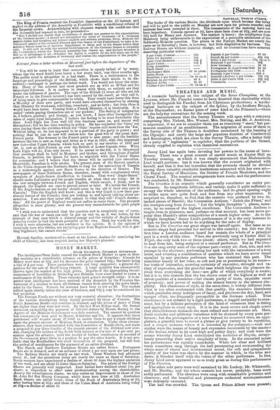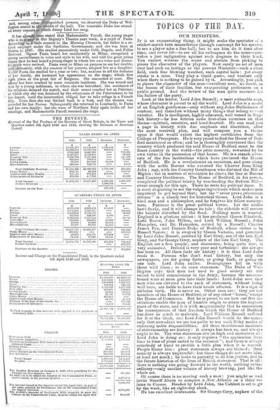Jenny Lind has again been devoting her powers to the
cause of bene- ficence. There was a great concert of sacred music at Exeter Hall on Tuesday evening, at which it was simply announced that Mademoiselle Lind would perform; bat it was known that the concert originated with herself, and that it was her intention that the proceeds should be divided among three valuable charitable institutions connected with her own art— the Royal Society of Musicians, the Society of Female Musicians, and the Choral Fund. The musical arrangements were made, and the performance was conducted, by Mr. Benedict.
The Creation is an oratorio which generally constitutes an entire per- formance. Its magnitude, loftiness, and variety, make it quite sufficient to occupy the whole attention of the audience; and its grand opening ought to strike upon ears quite fresh and free from any other impression. It surprised us, therefore, to find that the oratorio was prefaced by two de- tached pieces of Handel; the Coronation Anthem, " Zadok the Priest.," and the trumpet-song from Samson, " Let the bright Seraphim "; pieces, more- over, by no means of the highest excellence. The Coronation Anthem is simple even to plainness, and, perhaps on that account, has been more po- pular than Handel's other compositions of a much higher order. As to the " Bright Seraphim," Jenny Lind's performance of it is the only instance in which we have known her to do anything for the sake of display.
But in The Creation our great singer was herself again. Her fame as an oratorio-singer had preceded her arrival in this country; but this was the first time a London audience heard her sustain the whole of a principal part in a work of this class. When she previously sang at Exeter Hall in Elijah, she only took two or three pieces; others, which we had expected to hear from her, being assigned to a second performer. But in The Crea- tion she sang every note of the soprano part—every air, duet, trio, and solo passage in the choruses; performing her task with the earnestness of a true artist, and evincing a combination of qualities which we have never found equalled by any previous performer who has sustained this part. The matchless beauty of her voice, so soft and yet so penetrating in its tones— her truth of intonation, unerring certainty of execution, strength and va- riety of expression, and the graceful ease which heightens the pleasure de-
rived from everything she does—are gifts of which everybody is aware; but it is in this oratorio that she has shown some of the highest as well as rarest qualities of a musician—her classic purity of taste, exquisite sense of propriety, and power of uniting the utmost beauty to the utmost sim- plicity. Her chasteness of style, at the same time, is widely different from what is too often confounded with that quality, the excessive literalness which precludes every indulgence of fancy, and produces the dry, hard, and meagre effect, too frequently perceptible in the German school. True chasteness is not evinced by a rigid puritanism, a dogged antipathy to orna- ment, but by a delicate perception of the kind of ornament that is fitting and appropriate in every style. It is in the most severe and simple music that embellishment demands the most refined and consummate art. Here, florid roulades and arbitrary variations will be shunned by every pure per- former; but the prolongation of a tone beyond its measured time, an appo- giatura, a graceful turn to round a phrase or give variety to its repetition, and a simple cadenza where it is intended by the composer,—such and similar were the means of beauty and expression inculcated by the masters of the Italian school in its most high and palmy days; and such were the means whereby Jenny Lind embellished the melodies of Haydn, scrupu- lously preserving their native simplicity of form. In the concerted music her performance was equally remarkable. While her clear and brilliant tones sometimes rang through the hall penetrating and surmounting the whole mass of choral and instrumental sound, the soft and sympathetic quality of her voice was shown by the manner in which, in the trios and duets, it blended itself with the voices of the other performers. In fine, Jenny Lind never appeared to us so truly great as during this performance of The Creation.
The other solo parts were well sustained by Mr. Locket', Mr. Whitworth, and Mr. Machin; and the whole oratorio has never, probably, been more nobly performed. The choruses were sung with remarkable precision and clearness; and the beautiful and picturesque orchestral accompaniments were delicately executed.
The hall was crowded. The Queen and Prince Albert were present;
and, among other lington seated in ed every con 'shed persons, we observed the Duke of Wel- dale of the halL The venerable Duke has attend ch Jenny Lind has sung.



























 Previous page
Previous page